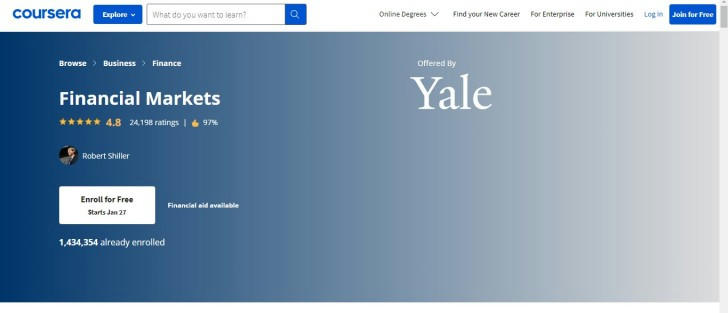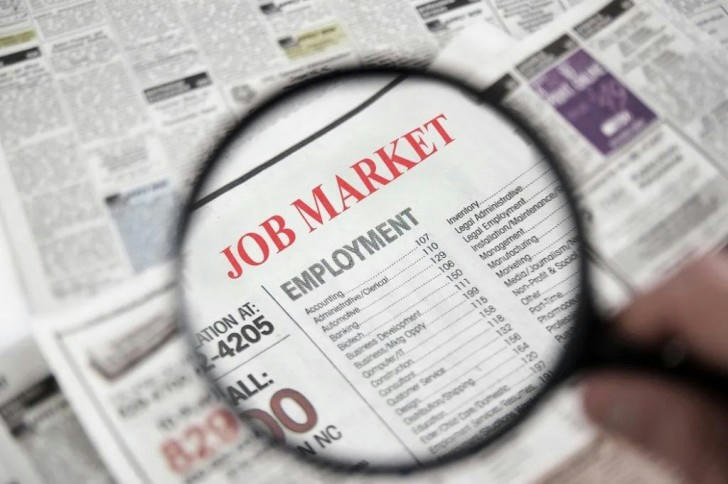Unlocking the World of Finance: Yale University's Free Financial Markets Course
Finance plays a vital role in our daily lives. From managing personal savings to making investment decisions, understanding financial markets is essential. Yale University offers a unique opportunity to dive into this world through its free Financial Markets course, taught by Nobel Prize-winning economist Robert Shiller. This course combines accessibility, expert insights, and real-world examples to make finance approachable and practical for everyone.

Why Understanding Financial Markets Matters

Financial literacy is no longer optional. In today’s interconnected world, economic shifts like inflation, technological advancements, and global crises affect us all. For example, U.S. inflation reached 9.1% in June 2022, the highest in 40 years, eroding household savings and purchasing power. Understanding these trends helps individuals and businesses adapt more effectively.
Similarly, during the 2008 global financial crisis, millions lost their homes and jobs due to risky financial practices. Yet, many lacked the knowledge to identify the warning signs of economic instability. More recently, the volatile rise and fall of cryptocurrencies like Bitcoin, which peaked at over $68,000 in late 2021 before plummeting below $17,000 in 2022, showcased how market dynamics can drastically impact investments.
Yale's Financial Markets course demystifies these topics. Whether you want to secure your financial future or make better business decisions, this course equips you with the knowledge to navigate the economic landscape with confidence.
What You’ll Learn
This course covers a broad range of essential topics:
• How Financial Markets Work: Learn the mechanisms behind stocks, bonds, and derivatives. For instance, why do stock prices fluctuate, and how do interest rates influence the bond market?
• Risk Management and Behavioral Finance: Discover how emotions and psychology drive market decisions. Did you know that fear and overconfidence contributed to the dot-com bubble in the late 1990s?
• Finance’s Role in Society: Explore how financial systems can address global challenges like poverty and climate change.
Through these lessons, you’ll gain insights into both the practical and theoretical aspects of finance. For instance, you’ll understand why diversification can minimize risk, or how inflation impacts long-term savings and investments.
Learn from a Nobel Laureate

One of the biggest draws of this course is its instructor, Robert Shiller. As a 2013 Nobel Prize winner in Economic Sciences, Shiller is renowned for his research on asset pricing and financial bubbles. His predictions about the dot-com bubble and the 2008 housing crisis proved remarkably accurate.
Shiller's teaching style is engaging and straightforward. Complex theories are broken down into simple concepts. For example, he explains speculative bubbles using relatable scenarios, helping learners understand why some markets are prone to excessive risk-taking and sudden crashes.
Real-World Case Studies
The course includes case studies that connect theoretical knowledge to real-world events. Key examples include:
1. The 2008 Financial Crisis: Learn how mortgage-backed securities and risky lending practices led to one of the most significant economic downturns in modern history, costing the global economy an estimated $10 trillion.
2. Cryptocurrency Trends: Understand the rapid rise and fall of Bitcoin and other digital currencies. By 2023, over 420 million people worldwide had used cryptocurrencies, highlighting their growing but unstable role in global finance.
3. COVID-19’s Impact on Markets: Examine how the pandemic caused stock markets to lose $6 trillion in value in February 2020 alone, but also accelerated trends like remote work and digital payment systems.
These case studies provide practical tools to evaluate current financial trends and make smarter decisions.
Flexible and Accessible
Yale’s Financial Markets course is hosted on Coursera, making it globally accessible. The course is:
• Free: There’s no cost to access the materials, eliminating financial barriers.
• Self-Paced: You can learn on your schedule, fitting the lessons into your daily routine.
• Optional Certification: For those seeking official recognition, a certificate of completion is available for a small fee.
Whether you're a student, a working professional, or simply curious about finance, this flexibility makes the course suitable for everyone.
Boost Your Career

In today’s competitive job market, financial knowledge is a valuable asset. According to the U.S. Bureau of Labor Statistics, jobs in the financial sector are expected to grow 7% by 2031, faster than the average for all occupations.
Roles like financial analysts, investment advisors, and risk managers are in high demand. For example, financial analysts in the U.S. earn a median annual salary of $95,570, making it an attractive field for career growth.
Even if you’re not in the finance industry, understanding market dynamics can improve your decision-making. Entrepreneurs can better assess the right time to secure funding, while investors can develop strategies to manage risks effectively and seize opportunities.
Finance as a Tool for Positive Change
Beyond personal benefits, financial systems have the potential to solve global challenges. For instance:
• Microfinance programs: Organizations like Grameen Bank have provided small loans to over 9 million entrepreneurs, helping them escape poverty and build sustainable businesses.
• Green bonds: In 2022, global green bond issuance surpassed $500 billion, funding projects like renewable energy and sustainable infrastructure to combat climate change.
By understanding these mechanisms, learners can explore ways to contribute to a more sustainable and equitable future.
Why You Should Enroll Now

Economic uncertainty is a constant. For example, the collapse of Silicon Valley Bank in early 2023 demonstrated how quickly financial instability can ripple through markets, causing panic and economic disruption.
Whether it’s inflation eating into savings or technological disruptions reshaping industries, being financially literate gives you an edge. A recent survey by the National Financial Educators Council revealed that 38% of Americans lost at least $500 in 2022 due to poor financial decisions, underscoring the importance of financial knowledge.
Yale’s Financial Markets course is a rare chance to learn from a world-class expert without any financial barriers. With over 5 million learners already enrolled, this course has transformed how people approach finance.
Take the first step toward mastering financial markets and building a brighter, more secure future. Start your journey today on Coursera and unlock the transformative power of financial knowledge!
